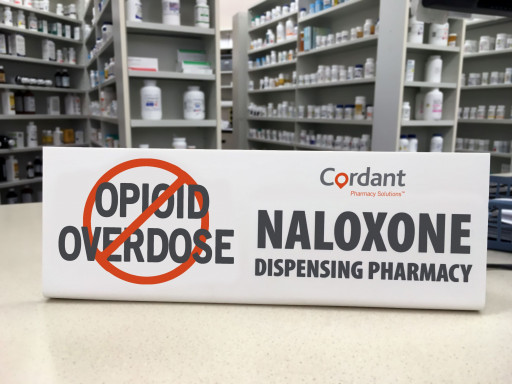PORTLAND, Ore., Aug. 24, 2022 (GLOBE NEWSWIRE) -- Cordant Health Solutions®, a leader in providing innovative tools for addiction treatment programs, is partnering with addiction treatment providers to improve patient access to the lifesaving opioid overdose reversal drug naloxone to fight back against the alarming rise in fatal overdoses driven by fentanyl.
Overdose deaths have risen sharply over the last two years. According to the Centers for Disease Control and Prevention (CDC), over 107,000 people in the U.S. died from an overdose in 2021, more than 60% of which were due to synthetic opioids, including fentanyl. The Oregon Health Authority estimates that five Oregonians die every week from opioid related overdoses.
To increase harm reduction efforts and "meet patients where they are," many clinicians believe a treatment protocol that includes delivering naloxone to patients in conjunction with therapy and medications for opioid use disorder (MOUD) supports treatment and is critical to preventing fatal overdoses.
Cordant's pharmacy program, Cordant Pharmacy Solutions™, supports clinicians who treat patients with substance use disorder (SUD) by delivering medication to patients at the treatment clinic in coordination with their treatment appointment, helping to eliminate many of the barriers to treatment that patients with addiction face, such as transportation issues, availability of medication when needed, and feelings of shame or stigma faced when filling prescriptions.
American Society of Addiction Medicine (ASAM) encourages the co-prescribing of naloxone for people at risk of overdose, including those diagnosed with and being treated for opioid use disorder.
Cordant works with Equinox Clinics, an Oregon-based medical practice that specializes in treating patients with SUD, and other clinicians to provide convenient access to naloxone, delivering it along with other addiction treatment medications to the patient in coordination with their treatment appointment as a part of its managed medication-assisted treatment (MAT) pharmacy program.
"One thing I've added to our new patient intake is asking patients if they've overdosed, not recently, not in the last year, but ever," said Randall Kelly, co-owner and co-founder of Equinox. "If they say yes, 95% of them will say someone has given them naloxone."
Relapse is a common part of recovery. Research has shown that drug dependence is a chronic medical illness and has similar rates of relapse (40-60% in people being treated for SUD) as conditions like diabetes, hypertension, and asthma.
Unlike many other medical conditions, however, relapse can be more dangerous for people in treatment programs, especially during the induction phase that requires detoxification, as they have a higher risk of overdose due to loss of opioid tolerance.
Rio McWilliams, co-owner and co- founder of Equinox Clinics, explained that many of their patients experience homelessness and have the additional risk factor of environmental exposure or temptation to use drugs while sharing tents or homeless shelters with others who are using. Often, the drugs being consumed are a mixture of a variety of illicit substances, including fentanyl.
"Everything has changed. Fentanyl is everywhere," said McWilliams. "Patients that I have seen for months who were on the straight and narrow slipped just once and had an overdose taking something that had fentanyl in it."
For many of their patients, naloxone isn't just a tool in their own recovery. "They're familiar with it, they've given it to someone, or someone's given it to them," said Kelly. "I've had patients who've said they've saved other people as well. Patients are now starting to say, I might need more than one."
"I tell patients, I'm going to prescribe you naloxone and every time you walk out the door, I want you to have that naloxone with you. Not just because you're coming to our clinic to get treatment, but you may be in a situation where you can save somebody else's life," said McWilliams. "We plan on doing a push to get naloxone into the hands of every patient who walks through our doors and Cordant's program gives us the ability to do so. We can preserve a community, just by increasing access to naloxone."
"Recovery is only possible if you are alive," said Bob Mann, executive vice president of Cordant's integrated services. "Unfortunately, in the past there has been the misconception that naloxone was a medication that enabled drug abuse. We see it as a way to keep your friend or family member alive to be able to get the treatment they need and eventually get their life back."
"Recovery is only possible if you are alive," said Bob Mann, executive vice president of Cordant's integrated services. "Unfortunately, in the past there has been the misconception that naloxone was a medication that enabled drug abuse. We see it as a way to keep your friend or family member alive to be able to get the treatment they need and eventually get their life back."
About Cordant Health Solutions®
Cordant Health Solutions® (cordantsolutions.com) provides innovative solutions for clinicians, organizations and payers involved with substance use disorder, pain management and criminal justice cases to provide accurate, actionable results to hold patients accountable, reduce risk and improve patient outcomes. A leader in quality standards, Cordant integrates its unique specialized pharmacy services for medication-assisted treatment and associated behavioral health conditions with drug testing options that include monitoring and risk assessment tools to improve patient accountability and optimize quality of life.
For media inquiries, contact Kim Kudasik, Senior Marketing Manager, kkudasik@cordanths.com.
###
Related Images

Image 1: Stop Opioid Overdoes Naloxone
a desktop sign that says stop opioid overdose, Cordant is a naloxone dispensing pharmacy
This content was issued through the press release distribution service at Newswire.com.
Attachment
